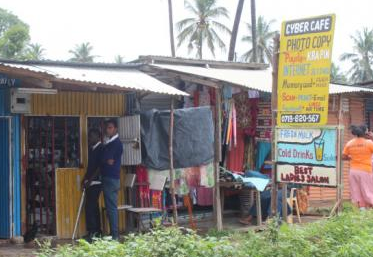I've spent the past few weeks in Indonesia, one of the countries at the forefront of the developing world's internet revolution. I often work out of a nearby convenience store that has a wifi connection.
Behind the store is a maze of sheet-metal homes, where families sleep ten to a room on drab concrete floors. The neighborhood lacks plumbing, and open sewers line the alleys. Heavy rains regularly flood people's rooms with polluted water, so the residents rely on high-hanging flower plants and cages of singing birds to beautify their surroundings.
Last week I arrived at the store before sunrise for a Skype call with a colleague in California. I placed my laptop on a table facing the window and started a video conference. My confident professional colleague appeared on the screen, her elegant home visible in the background. Even though we were on opposite sides of the world, it was as though we were in the same room.
During the call I glanced up, and realized the two of us were not alone. Outside the big glass window, a woman about my age was methodically searching through a garbage bin. I guessed that she was looking for bottles that could be sold for recycling, or edible leftovers. Perhaps there had been no money that morning to buy food for her children's breakfast. Her eyes met mine, but there was no hint of envy. She had the grim look of someone who has given up hope that tomorrow will be different from today.
My colleague in California chatted on brightly, and I refocused on our conference. Being in a low-income neighborhood in Jakarta didn't hinder my ability to interact with the rest of the world. The internet made geography all but irrelevant for me.
But I kept thinking about the woman on the other side of the window. Unlike me, she was a prisoner of physical location. The dearth of opportunities in her immediate community left her with few options for survival. An accident of birth had put our lives on radically different trajectories.
There is nothing new about the fact that a person who happens to have been born in one part of the world will enjoy far fewer opportunities than someone born in another part of the world. We're so accustomed to this state of affairs that we no longer dwell on its monstrous injustice.
But in fact, the assumption that geography determines opportunity is outdated. In the last several years, cheap cybercafes have proliferated even in the most marginalized parts of Africa, Asia and Latin America. Often little more than a collection of second-hand desktops in a room the size of a closet, these establishments offer browsing for just pennies at a time. Young adults often visit the cybercafes to read the news, look for jobs and catch up with migrating friends and relatives via Facebook.
This new connectivity opens up access to the vast array of online resources that are available to anyone with an internet connection, from Harvard students to slum dwellers in Nairobi. As more information and services are moved into the cloud, physical location is becoming less of a barrier for people who can go online.
Teenagers who cannot afford university are educating themselves via Wikipedia and the Khan Academy. Jewelry craftsmen in India are getting better prices by listing their creations on eBay. Cash-strapped clinics in Haiti use Watsi to crowd-fund medical treatments for low-income patients. Stay-at-home moms in Kenya use Odesk to make money transcribing data for companies in China.
My own organization, Zidisha, operates an international person-to-person lending service. Young adults in the world's poorest countries use Zidisha to offer lenders worldwide the opportunity to invest in life-improving projects - everything from sewing machines to college tuition - and be repaid with interest. Since Zidisha uses an online platform to bypass expensive local banks and take advantage of international differences in purchasing power, the entrepreneurs pay just a fraction of the cost of loans from traditional sources. Connecting these entrepreneurs to an international person-to-person lending market generates an economic windfall.
Part of the reason we've stopped paying attention to geographic inequality is that the problem was so intractable throughout the twentieth century that we've almost given up on it. Human habits tend to adapt slowly when technological change suddenly makes hitherto unsolvable problems solvable. Real change happens when innovators develop tools that harness the new technologies in ways ordinary people can appreciate.
The lady on the other side of the convenience store window may not be online, but it is likely she has a friend or relative who is. It is only a matter of time before they learn to use this connectivity to access resources that were previously out of reach - freeing themselves and many around them from the geographic handicap.
Thanks to Zidisha member Samuel Shehi for contributing a photo of his cybercafe for this post.
